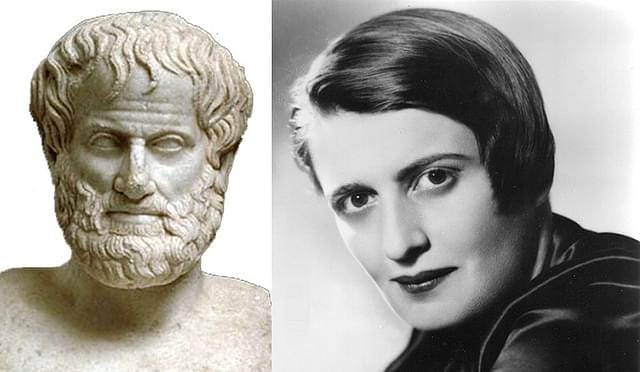
Society has gone insane because reason has been abandoned — first by philosophers, then by social scientists, and now by politicians, corporate heads and (increasingly) by actual scientists.
Ayn Rand [1905-1982, author of “Atlas Shrugged” and “The Fountainhead”] had a beautiful, brilliant mind. She anticipated what ultimately came to pass a few decades ago when she wrote about the decline of reason in Western civilization:
Rand wrote: “If there is a philosophical Atlas who carries the whole of Western civilization on his shoulders, it is Aristotle. He has been opposed, misinterpreted, misrepresented, and—like an axiom—used by his enemies in the very act of denying him. Whatever intellectual progress men have achieved rests on his achievements.
Aristotle may be regarded as the cultural barometer of Western history. Whenever his influence dominated the scene, it paved the way for one of history’s brilliant eras; whenever it fell, so did mankind. The Aristotelian revival of the thirteenth century brought men to the Renaissance. The intellectual counter-revolution turned them back toward the cave of his antipode: Plato.
There is only one fundamental issue in philosophy: the cognitive efficacy of man’s mind. The conflict of Aristotle versus Plato is the conflict of reason versus mysticism. It was Plato who formulated most of philosophy’s basic questions—and doubts. It was Aristotle who laid the foundation for most of the answers. Thereafter, the record of their duel is the record of man’s long struggle to deny and surrender or to uphold and assert the validity of his particular mode of consciousness.” …
Rand continues: “Aristotle’s philosophy was the intellect’s Declaration of Independence. Aristotle, the father of logic, should be given the title of the world’s first intellectual, in the purest and noblest sense of that word. No matter what remnants of Platonism did exist in Aristotle’s system, his incomparable achievement lay in the fact that he defined the basic principles of a rational view of existence and of man’s consciousness: that there is only one reality, the one which man perceives—that it exists as an objective absolute (which means: independently of the consciousness, the wishes or the feelings of any perceiver)—that the task of man’s consciousness is to perceive, not to create, reality—that abstractions are man’s method of integrating his sensory material—that man’s mind is his only tool of knowledge—that A is A.
If we consider the fact that to this day everything that makes us civilized beings, every rational value that we possess—including the birth of science, the industrial revolution, the creation of the United States, even the structure of our language—is the result of Aristotle’s influence, of the degree to which, explicitly or implicitly, men accepted his epistemological principles, we would have to say: never have so many owed so much to one man.”
Follow Dr. Hurd on Facebook. Search under “Michael Hurd” (Rehoboth Beach DE). Get up-to-the-minute postings, recommended articles and links, and engage in back-and-forth discussion with Dr. Hurd on topics of interest. Also follow Dr. Hurd on Twitter at @MichaelJHurd1, @DrHurd on Gab, drmichaelhurd on Instagram and @Drhurd on Parler.
